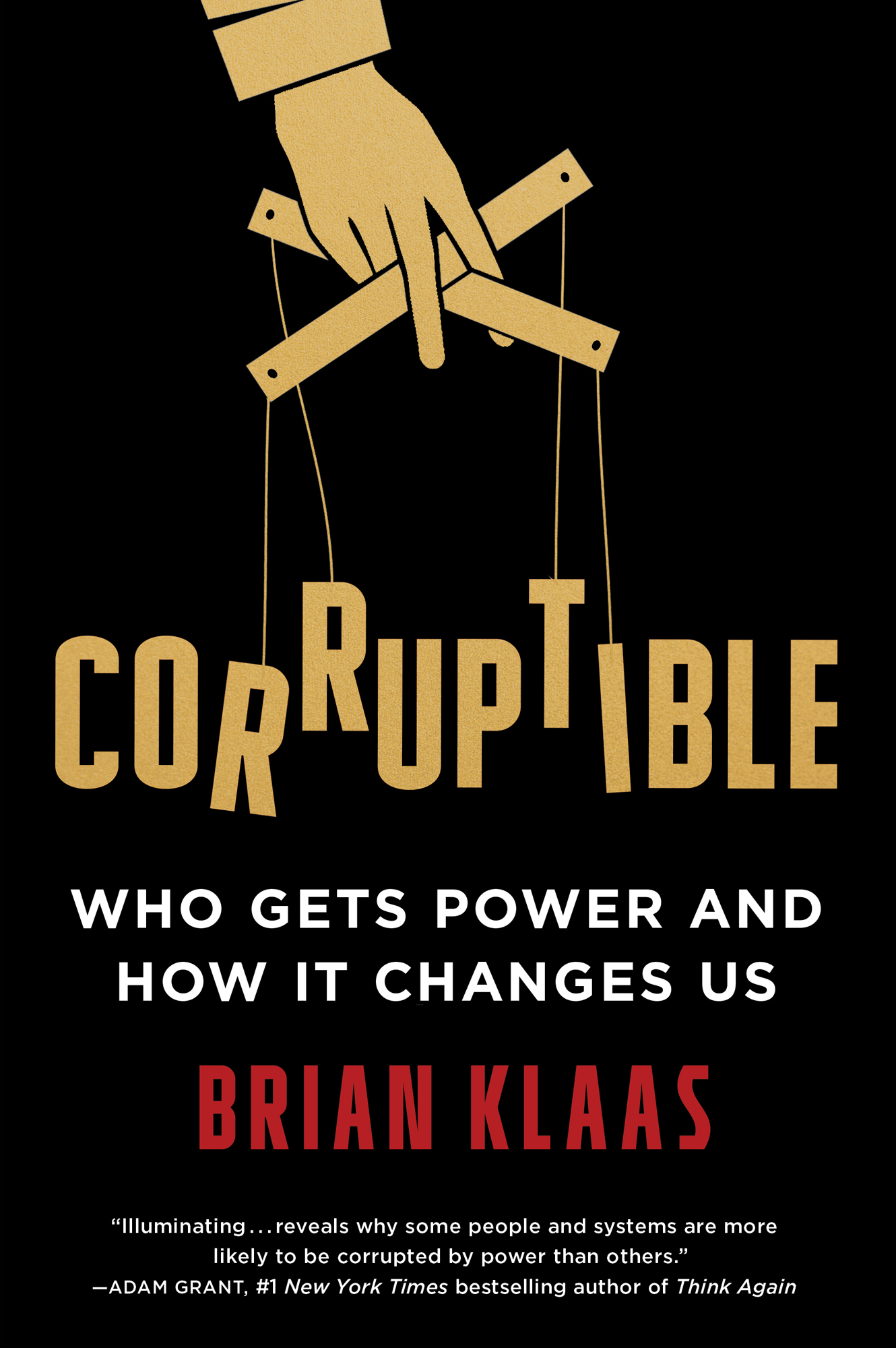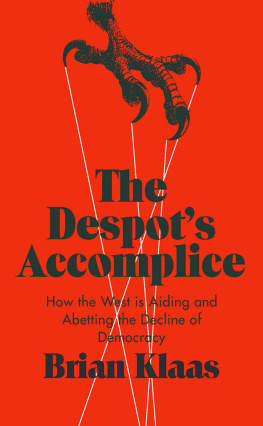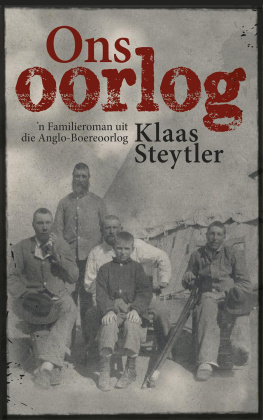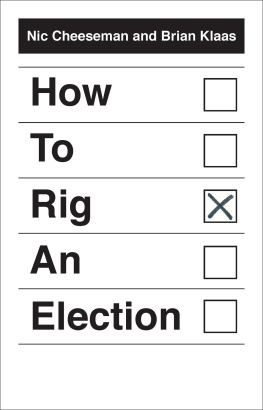Brian Klaas - Who Gets Power and How It Changes Us
Here you can read online Brian Klaas - Who Gets Power and How It Changes Us full text of the book (entire story) in english for free. Download pdf and epub, get meaning, cover and reviews about this ebook. year: 2021, publisher: Scribner, genre: Politics. Description of the work, (preface) as well as reviews are available. Best literature library LitArk.com created for fans of good reading and offers a wide selection of genres:
Romance novel
Science fiction
Adventure
Detective
Science
History
Home and family
Prose
Art
Politics
Computer
Non-fiction
Religion
Business
Children
Humor
Choose a favorite category and find really read worthwhile books. Enjoy immersion in the world of imagination, feel the emotions of the characters or learn something new for yourself, make an fascinating discovery.

- Book:Who Gets Power and How It Changes Us
- Author:
- Publisher:Scribner
- Genre:
- Year:2021
- Rating:5 / 5
- Favourites:Add to favourites
- Your mark:
- 100
- 1
- 2
- 3
- 4
- 5
Who Gets Power and How It Changes Us: summary, description and annotation
We offer to read an annotation, description, summary or preface (depends on what the author of the book "Who Gets Power and How It Changes Us" wrote himself). If you haven't found the necessary information about the book — write in the comments, we will try to find it.
Who Gets Power and How It Changes Us — read online for free the complete book (whole text) full work
Below is the text of the book, divided by pages. System saving the place of the last page read, allows you to conveniently read the book "Who Gets Power and How It Changes Us" online for free, without having to search again every time where you left off. Put a bookmark, and you can go to the page where you finished reading at any time.
Font size:
Interval:
Bookmark:

Corruptible
Who Gets Power and How It Changes Us
Brian Klaas
Illuminating reveals why some people and systems are more likely to be corrupted by power than others.
Adam Grant, #1 New York Times Bestselling author of Think Again
Passionate, insightful, and occasionally jaw-dropping, Corruptible sets out the story of the intoxicating lure of powerand how it has shaped the modern world.
Peter Frankopan, internationally bestselling author of The Silk Roads: A New History of the World
We know power corrupts, but how exactly? Is it a quick moral collapse or a slow rot? Dangerous as a drug addiction, power changes both those who have it and those who just want a quick fix. Klaas gives us a new, insightful, and seditious road map to this primal urge to dominate, which, thankfully, not all of us share equally.
Richard Engel, chief foreign correspondent of NBC News
The power-hungry dont ask why, they only ask why not. Keeping such people far from the levers of power is at least half the battle, as Brian Klaas explains so well in Corruptiblea GPS system for navigating a world increasingly full of illiberal democracies, modernized dictatorships, and populists who care only for power.
Garry Kasparov, chairman of both the Renew Democracy Initiative and the Human Rights Foundation and former world chess champion
A brilliant exploration This book builds Brian Klaass reputation, offering an essential guide through our world of democratic decay, corruption, and cronyism.
Dan Snow, bestselling author of On This Day in History
Thank you for downloading this Simon & Schuster ebook.
Get a FREE ebook when you join our mailing list. Plus, get updates on new releases, deals, recommended reads, and more from Simon & Schuster. Click below to sign up and see terms and conditions.
CLICK HERE TO SIGN UP
Already a subscriber? Provide your email again so we can register this ebook and send you more of what you like to read. You will continue to receive exclusive offers in your inbox.

To all the nice, non-psychopaths out there who should be in power but arent
D oes power corrupt, or are corrupt people drawn to power? Are entrepreneurs who embezzle and cops who kill the outgrowths of bad systems, or are they just bad people? Are tyrants made or born? If you were thrust into a position of power, would new temptations to line your pockets or torture your enemies gnaw away at you until you gave in? Somewhat unexpectedly, we can start to find an answer to those questions on two forgotten, faraway islands.
Far off the western coast of Australia, a little speck of land called Beacon Island barely rises above the surrounding sea. Scrubby green grass covers its surface, skirted by beige sand on its triangular coastline. You could just about throw a baseball from one side and hit the ocean on the other. It seems unremarkable, an uninhabited blip of an island with a bit of coral peppering the shallows offshore. But Beacon Island holds a secret.
On October 28, 1628, a 160-foot-long spice ship called the Batavia set sail from the Netherlands. The trading vessel was part of a fleet owned by the Dutch East India Company, a corporate empire that dominated global trade. The Batavia carried a small fortune in silver coins, ready to be exchanged for spices and the exotic riches that awaited in Java, part of modern-day Indonesia. It carried 340 people. Some were passengers. Most were crew. One was a psychopathic pharmacist.
The ship was organized into a strict hierarchy, in which the accommodation got more spartan as one moved toward the bow. In the stern, the captain held court in the great cabin, chewing on salted meat as he barked orders to his officers. Two decks below, soldiers were crammed into an unventilated, rat-infested crawl space that would be used to hold spices on the return journey. All on Batavia knew their rank.
A few rungs below the captain was a junior merchant named Jeronimus Cornelisz, a down-and-out former apothecary. Hed signed up to sail in desperation after losing everything through a series of personal calamities. Shortly after the sails were first unfurled, he set in motion a plan to reverse his misfortunes. In conjunction with a senior officer, Cornelisz plotted a mutiny. He steered the ship off course in preparation for seizing control in isolated waters. If all went according to plan, hed take control of the Batavia and start a lavish new life, bought with the silver coins in the hold.
It didnt go according to plan.
On June 4, 1629, the wooden hull of the Batavia splintered as it crashed full speed into a coral reef in the low-lying Abrolhos Islands off the Australian coast. Thered been no warning, no call to change course. In an instant, it was clear that the boat was doomed. Most of the passengers and crew tried to swim ashore. Dozens drowned. Others tried to cling to what was left of the Batavia.
Realizing that nobody would survive unless they were rescued, the captain took control of the emergency longboat and most of the salvaged supplies. With forty-seven others, including the entire senior leadership of the crew, he set off for Java. He promised that theyd soon return with a rescue party. Hundreds were abandoned, with little food, almost no water, and only a faint hope that, someday, someone would return. Nothing grew or lived on the barren island. It was obvious: the survivors were running out of time.
Cornelisz, the would-be mutineer, was among those left behind. There was no longer a seaworthy ship to take over. But he didnt know how to swim, so standing on what remained of the sinking Batavia seemed preferable to plunging into the water and frantically splashing his way to the island. For nine days, seventy men, including Cornelisz, occupied a shrinking territory of dry wood. They drank as they contemplated the inevitable.
On June 12, the ship finally broke apart. The surf bashed some of the remaining men against the sharp coral, giving them a quicker end than others who flailed for a few minutes before drowning. Cornelisz somehow survived. He eventually floated to the island in a mass of driftwood, the last man to escape Batavia alive.
When he reached the refuge of soggy sand on what is now Beacon Island, the anarchy and chaos of survival instincts reverted to the established order of hierarchy and status. Though Cornelisz washed ashore ragged and weak, he was still an officer. That meant he was in charge. The Batavia was a highly hierarchical society, the historian Mike Dash says, and that survived on the island as well. The hundreds marooned on the sparse grasslands of the pitiful island rushed to help their superior. Theyd live to regret it. Or at least some would.
Once recovered and replenished, Cornelisz did some quick calculations. The situation was dire. The food, water, and wine that had survived the wreck wouldnt last. The supply wasnt going to expand, he figured, so it was necessary to reduce the demand. The survivors needed fewer stomachs to fill.
Cornelisz started to consolidate power by eliminating potential rivals. Some were sent on foolhardy missions in small boats and then pushed overboard to drown. Others were accused of crimes, a pretext used to sentence them to death. Those grisly executions asserted Corneliszs authority. But they also provided a useful loyalty test. Men who would kill on his orders were useful. Men who refused were a threat. One by one, the threats were eliminated. Soon, the pretexts disappeared, too. A boy was decapitated to test whether a sword was still sharp. Children were murdered for no reason. The killings were done on Corneliszs orders, but he didnt murder anyone himself. Instead, he displayed his dominance by dressing himself in fine garb from the ship: silk stockings, garters with gold laces, and suchlike adornments. The others wore soiled rags as they waited their turn to be murdered.
Font size:
Interval:
Bookmark:
Similar books «Who Gets Power and How It Changes Us»
Look at similar books to Who Gets Power and How It Changes Us. We have selected literature similar in name and meaning in the hope of providing readers with more options to find new, interesting, not yet read works.
Discussion, reviews of the book Who Gets Power and How It Changes Us and just readers' own opinions. Leave your comments, write what you think about the work, its meaning or the main characters. Specify what exactly you liked and what you didn't like, and why you think so.











